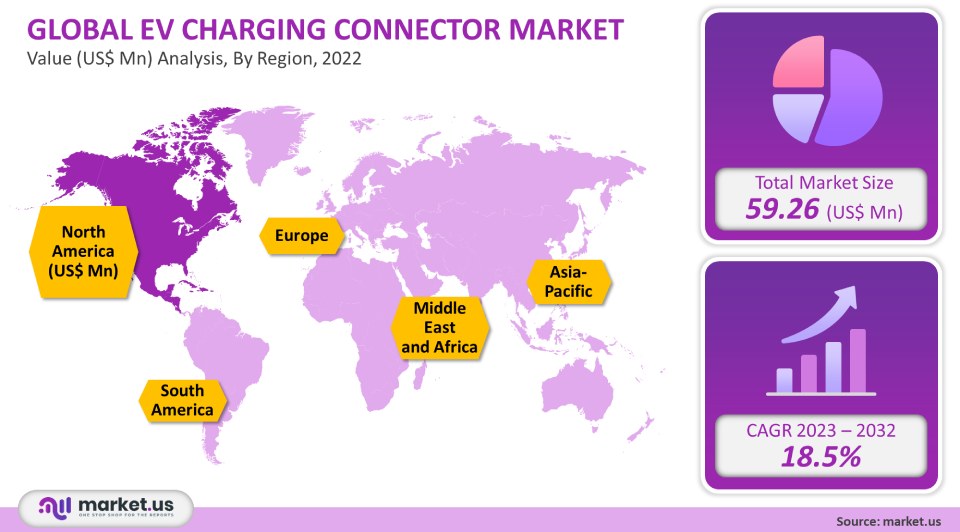The EV charging connector market refers to the segment of the automotive industry that focuses on connectors and cables used for electric vehicle (EV) charging. These connectors play a crucial role in facilitating the transfer of electrical power between the charging infrastructure and EVs. The market includes various types of connectors, such as Type 1 (SAE J1772), Type 2 (IEC 62196), CCS (Combined Charging System), and CHAdeMO, catering to different charging standards and protocols.
The global EV charging connector market is projected to reach a valuation of USD 323.56 Mn by 2032 at a CAGR of 18.5%, from USD 59.26 Mn in 2022.
Key Takeaways:
- Electrification of Transportation: The global shift towards electric vehicles as a sustainable transportation solution is driving the demand for EV charging connectors. With the increasing adoption of EVs, there is a growing need for reliable and efficient charging infrastructure, and connectors play a vital role in enabling fast and safe charging.
- Standardization and Interoperability: Standardization of charging connectors and protocols is crucial for ensuring compatibility and interoperability between charging stations and EVs from different manufacturers. The establishment of widely accepted charging standards, such as CCS and CHAdeMO, has facilitated the development and deployment of EV charging connectors.
- Rapid Charging Technologies: The development of high-power charging technologies, such as DC fast charging, has led to the demand for connectors capable of delivering higher charging speeds. EV charging connectors need to support high currents and voltages to enable fast charging and reduce charging times.
- Infrastructure Development: The expansion of EV charging infrastructure is a significant driver for the EV charging connector market. Governments, utility companies, and private organizations are investing in the installation of charging stations, both in public and private spaces, to support the growing EV market.
- Technological Advancements: EV charging connectors are evolving to incorporate advanced features and technologies. This includes features like authentication and communication capabilities, smart charging functionalities, and improved safety mechanisms to ensure efficient and secure charging operations.
Get a holistic overview of market by industry experts to evaluate and develop growth strategies. Download the Sample
Predictions about the Future:
- Increased Demand for Ultra-fast Charging: As battery technologies advance, there will be a growing demand for ultra-fast charging capabilities. This will drive the development of EV charging connectors that can support higher power levels and faster charging speeds.
- Expansion of Wireless Charging: Wireless charging technologies for EVs are gaining traction. The future will see the integration of wireless charging capabilities into EV charging connectors, enabling convenient and efficient charging without the need for physical cable connections.
- Integration of Smart Features: EV charging connectors will increasingly incorporate smart features, such as vehicle-to-grid (V2G) communication, data monitoring, and remote control capabilities. These features will enable users to monitor charging sessions, optimize energy usage, and participate in demand response programs.
- Enhanced Safety and Security Measures: The focus on safety and security will drive the development of EV charging connectors with enhanced protection against electrical hazards, unauthorized access, and cybersecurity threats. This will ensure safe and secure charging experiences for EV owners.
- Standardization and Global Interoperability: Efforts towards global standardization and interoperability will continue to unify the EV charging ecosystem. This will enable EV drivers to charge their vehicles at any charging station, regardless of the connector type or charging protocol, promoting widespread adoption of EVs.
Strategic Developments:
- Collaborations and Partnerships: Companies in the EV charging connector market are forming strategic collaborations and partnerships to ensure compatibility and interoperability between their products. These collaborations aim to create seamless charging experiences for EV owners and expand the charging network.
- Research and Development Investments: Companies are investing in research and development to develop innovative and technologically advanced EV charging connectors. This includes the integration of smart features, wireless charging capabilities, and enhanced safety measures to meet the evolving needs of the market.
Directly Purchase a copy of the report | Quick Delivery Available – https://market.us/purchase-report/?report_id=84877
Regional Landscape:
The EV charging connector market is globally distributed, with key regions including North America, Europe, Asia Pacific, Latin America, and the Middle East and Africa. The market’s growth is driven by government initiatives, incentives, and regulations promoting electric vehicle adoption, as well as the development of charging infrastructure in each region. Europe and North America are leading regions in terms of EV sales and charging infrastructure deployment, followed by Asia Pacific, where rapid urbanization and supportive government policies are driving the market’s growth.

Market Key Players:
- AZAKI Corporation
- TE Connectivity
- Sumitomo Corporation
- Schneider Electric
- HUBER+SUHNER
- Tesla
- Robert Bosch GmbH
- ITT INC.
- ABB Ltd.
- Siemens AG
- Others.
Market Segmentation:
Based on Product Types
- CHAdeMO
- Tesla
- Other Product Types
Based on Voltages
- AC Charging
- DC Charging
Based on Charging Speeds
- Slow
- Fast
- Rapid
Based on Vehicle Types
- Passenger Vehicles
- Commercial Vehicles
Conclusion:
The EV charging connector market is experiencing significant growth due to the increasing adoption of electric vehicles and the expansion of charging infrastructure worldwide. Standardization, interoperability, technological advancements, and safety measures are key factors shaping the market. Companies in this market are focusing on strategic collaborations, research and development investments, and expanding their product portfolios to meet the evolving needs of the EV ecosystem. With the continued growth of the electric vehicle market, the demand for reliable, efficient, and user-friendly EV charging connectors is expected to further increase in the future.
Explore More Reports
Gas Sensors Market to Reach USD 5,302 Million in 2032 with a CAGR of 7.8%, Report by Market.us